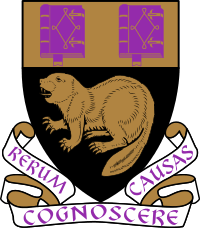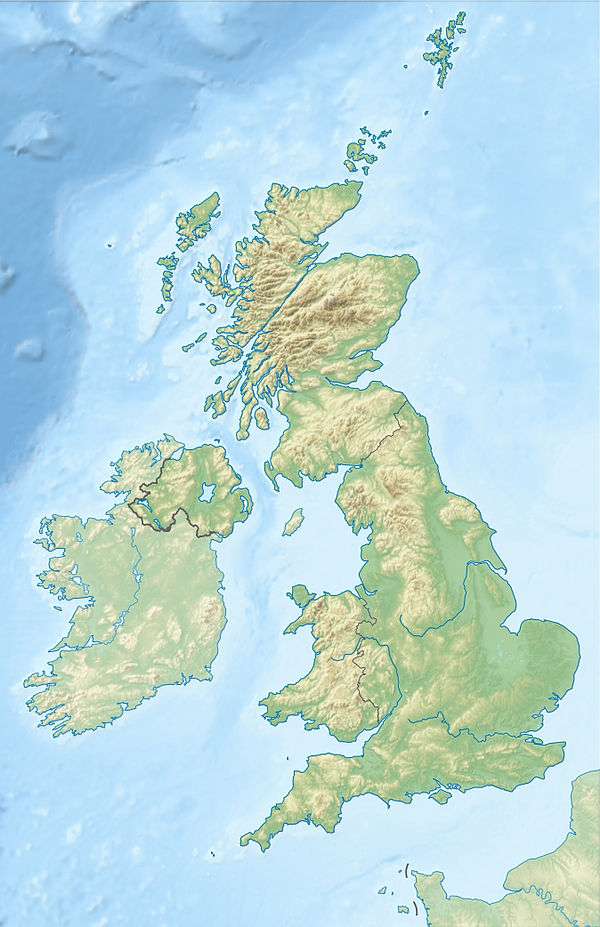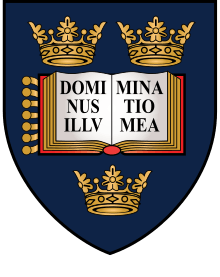Golden triangle (universities)
Locations of 'golden triangle' universities.
The "golden triangle" is a group of elite universities located in the English cities of Cambridge, London and Oxford, as listed below:[1][2]
 University of Cambridge
University of Cambridge
 Imperial College London
Imperial College London
 King's College London
King's College London
 London School of Economics
London School of Economics
 University College London
University College London
 University of Oxford
University of Oxford
The corners of the triangle are formed by the University of Cambridge, the University of Oxford, and to the south-east, Imperial College London and three constituent colleges of the University of London granted degree-awarding powers: King's College London, London School of Economics and Political Science, and University College London, although some articles omit either King's College London or the London School of Economics.[3][4] The members of the triangle have among the highest research incomes of all British universities and collaborate closely through initiatives such as the G5,[5] SES-5,[6] Global Medical Excellence Cluster (GMEC)[7][8] and MedCity.[9] The term, originally coined to describe a group of universities with a large research income, is now also used as a short-hand for the members' perceived prestige and reputation.[10]
Rankings
World
National
In the The Sunday Times 10-year (1998–2007) average ranking of British universities based on consistent league table performance; Cambridge, Oxford, LSE, Imperial and UCL (in order) claimed the top 5 positions whilst King's was placed joint 14th.[24]
Research income
Highest total research income for universities (out of 161 British universities, year 2013/14) [25]
| Rank |
University |
Research income (£,000) |
| 1 |
University of Oxford |
478,300 |
| 2 |
University College London |
374,503 |
| 3 |
University of Cambridge |
371,200 |
| 4 |
Imperial College London |
350,900 |
| 5 |
University of Edinburgh |
215,934 |
| 6 |
University of Manchester |
213,726 |
| 7 |
King's College London |
171,547 |
| 8 |
University of Glasgow |
133,618 |
| 9 |
University of Leeds |
132,677 |
| 10 |
University of Bristol |
131,500 |
| 43 |
London School of Economics |
027,038 |
Highest total grant income for universities from UK research councils (out of 161 British universities, year 2013/14)[26]
| Rank |
University |
Grant income (£,000) |
| 1 |
University of Edinburgh |
204,116 |
| 2 |
University College London |
182,437 |
| 3 |
University of Oxford |
182,200 |
| 4 |
University of Cambridge |
178,600 |
| 5 |
University of Manchester |
162,579 |
| 6 |
Imperial College London |
161,400 |
| 7 |
University of Glasgow |
161,213 |
| 8 |
Open University |
149,000 |
| 9 |
King's College London |
122,426 |
| 10 |
University of Leeds |
111,773 |
| 86 |
London School of Economics |
024,429 |
See also
Notes
References
- ↑ "Golden opportunities". Nature. 6 July 2005. : "No longer rivals, Oxford, Cambridge and London are now working towards a common goal — ensuring the 'golden triangle' becomes a global science hub."
- "Oxbridge windfall". Times Higher Education. 4 August 1995. : "A large amount of the cash awarded to humanities postgraduates still goes to the "Golden Triangle" of Oxford, Cambridge and London, British Academy figures reveal."
- Kershaw, Alison. "UK universities slip in rankings", The Independent, 4 October 2012: "Rankings editor Phil Baty said: "Outside the golden triangle of London, Oxford and Cambridge, England's world-class universities face a collapse into global mediocrity."
- ↑ "Investment in the UK Biotech Golden Triangle". Oxford Biotech. Retrieved 5 February 2016.
- ↑
- For LSE, see two articles by Zoe Corbyn.
- "In research, small is just as beautiful", Times Higher Education, 26 November 2009: "The findings reveal the full extent of the dominance of the golden triangle: papers from the universities of Oxford, Cambridge, University College London, Imperial College London, King's College London, and the London School of Economics were cited far more often than the world average," and
- "'Golden triangle' to win funding riches", Times Higher Education, 11 February 2010: "The other institutions in the Cambridge-Oxford-London 'golden triangle' - University College London, Imperial College London and the London School of Economics - will also receive big cash windfalls, as will the University of Manchester."
- ↑
- The golden triangle consists of Oxford, Cambridge and London's Imperial College, King's College and University College, see "Johnson floats £10bn biotech fund for London", Andrew Ward, Financial Times, 25 June 2015: "MedCity was launched last year to increase collaboration between Imperial College, King’s College and University College London — the capital’s three main science universities — and promote the broader 'golden triangle' between London, Cambridge and Oxford to investors."
- The golden triangle consists of Oxford, Cambridge and London's Imperial College, King's College, LSE and University College, see "London top city in global university rankings", Sean Coughlan, BBC News, 3 October 2013: "The so-called 'golden triangle' of UK universities - Oxford, Cambridge and leading London institutions - is seen as a breakaway elite group, with these universities consolidating their international reputations. Imperial College, University College London, LSE and King's College London are all in the top 40."
- Also talking about Oxford, Cambridge and London's Imperial College, King's College, LSE and University College, see "Golden Triangle pulls ahead in REF shake-out: UCL and KCL ascend power rankings, Manchester and Leeds fall", Miriam Frankel, Alison Goddard and Gretchen Ransow, Research Fortnight, 18 December 2014: "The top six universities in the so-called golden triangle--Oxford, UCL, Cambridge, Imperial, KCL and the London School of Economics and Political Science--have done particularly well in the Power Ratings."
- London's Imperial College, KCL, LSE and UCL, as well as Cambridge and Oxford, see "UK confirmed as 'global education superpower' in international university rankings", Rebecca Marriage, ReLocate Global, 11 March 2015: "The 'golden triangle' of Oxford, Cambridge and London strengthened its grip on UK higher education: As well as Cambridge and Oxford rising closer to the summit, University College London moved up from 25th to 17th, the London School of Economics rose two places to 22nd and King’s College London jumped eight places from 43rd to 31st."
- Jha, Alok. "Gold rush", The Guardian, 3 June 2003: "The golden triangle of Oxford, Cambridge, University College London and Imperial College, show no sign of slowing down in their race away from the rest of the sector when it comes to research funding."
- OECD Reviews of Regional Innovation OECD Reviews of Regional Innovation, North of England, UK, OECD, 2008, p. 222: "The "Golden Triangle" of ... the universities of Oxford and Cambridge, Imperial College and University College of London ..."
- Mullins, Justin. "England's golden triangle", New Scientist, 23 April 2005: "Take a look at any of the various league tables ranking universities around the world ... Oxford and Cambridge are in the top handful, while London's University College and Imperial College sit comfortably in the top 25. ... London, Oxford and Cambridge are a 'golden triangle' of academic success."
- Clark, Paul. "The golden triangle holds the secret", Times Higher Education, 1 March 2002: "Suppose, for the sake of argument, that the four institutions comprising the 'golden triangle' - Cambridge, Imperial College, Oxford and University College London - elect not to receive their block Higher Education Funding Council for England grant for teaching."
- That the golden triangle consists of Oxford, Cambridge and Imperial College, see The future sustainability of the higher education sector, House of Commons, Education and Skills Committee, The Stationery Office, 2007, p. 241.
- ↑ "Super elite in secret bid for cash boost". Times Higher Education. 6 February 2004. Retrieved 30 March 2014.
- ↑ "Research heavyweights deny 'ganging up'". Times Higher Education. 9 May 2013. Retrieved 30 March 2014.
- ↑ "GMEC"
- ↑ "Collaborate and listen, The Guardian, Tuesday 19 December 2006"
- ↑ "MedCity launched to promote South East's science 'golden triangle'". BBC News. 8 April 2014. Retrieved 8 April 2014.
- ↑ Espinoza, Javier. "Britain climbs up world university rankings". The Telegraph.
- ↑ "Academic Ranking of World Universities - 2015". Shanghai Ranking Consultancy. Retrieved 21 October 2015.
- ↑ "QS World University Rankings 2015/16". Quacquarelli Symonds. Retrieved 14 September 2015.
- ↑ "World University Rankings 2015-16". Times Higher Education. Retrieved 30 September 2015.
- ↑ "World Reputation Rankings 2015 results". Times Higher Education. Retrieved 3 April 2015.
- ↑ "CWTS Leiden Ranking 2015". Centre for Science and Technology Studies, Leiden University. Retrieved 21 October 2015.
- ↑ "US News Rankings". http://www.usnews.com/education/best-global-universities/search?region=europe&subject=&name=.
- ↑ "The 2015 Global University Employability Ranking". Emerging/Trendence. Retrieved 19 January 2016.
- ↑ "LSE in university league tables". London School of Economics. Retrieved 1 October 2015.
But we remain concerned that all of the global rankings - by some way the most important for us, given our highly international orientation - suffer from inbuilt biases in favour of large multi-faculty universities with full STEM (Science, Technology, Engineering and Mathematics) offerings, and against small, specialist, mainly non-STEM universities such as LSE.
- ↑ "THE 'Table of Tables' 2016: University of Cambridge top for fifth year running". Times Higher Education. Retrieved 2015-10-15.
- ↑ "Top UK University League Tables and Rankings 2016". Complete University Guide. Retrieved 2015-05-28.
- ↑ "University guide 2016: University league table". The Guardian. 21 May 2015.
- ↑ "The Times and Sunday Times University League Table 2016". The Times and Sunday Times. Retrieved 15 October 2015. (subscription required)
- ↑ "The best UK universities chosen by major employers". Times Higher Education (London). 12 November 2015.
- ↑ "University ranking based on performance over 10 years" (PDF). The Times (London). 2007. Archived from the original (PDF) on 14 April 2008. Retrieved 28 April 2008.
- ↑ (PDF). Times Higher Education. 27 April 2014 https://www.timeshighereducation.co.uk/sites/default/files/Attachments/2015/04/27/k/g/p/institutions-finances-compared-2013-2014-300415.pdf. Retrieved 30 June 2015.
- ↑ (PDF). Times Higher Education. 27 April 2015 https://www.timeshighereducation.co.uk/sites/default/files/Attachments/2015/04/27/k/g/p/institutions-finances-compared-2013-2014-300415.pdf. Retrieved 30 June 2015.
University associations and groupings in the United Kingdom |
|---|
| | Formal associations | |
|---|
| | Informal groupings | |
|---|
|
| Links to related articles |
|---|
| |
|---|
| | People | | |
|---|
| | Colleges | |
|---|
| Schools,
faculties &
departments | |
|---|
| | Student life | |
|---|
| | Sport | |
|---|
| | Affiliates | |
|---|
| | Categories |
- Chancellors
- Vice-Chancellors
- Colleges
- Departments
- Awards and Prizes
- Lists
- Terminology
|
|---|
| |
|
|
|---|
| | Academics | Faculties and
schools | |
|---|
| Departments
and centres | |
|---|
|
|---|
| | | | Affiliates | |
|---|
| |
|
|
|---|
| Campus and
collections | | |
|---|
| | Research centres | |
|---|
| | Student life | |
|---|
| | History | |
|---|
| | People | |
|---|
| | Affiliates | |
|---|
| |
|
|
|---|
| | |
|---|
| Faculties, schools
& groupings | |
|---|
| Centres &
departments | |
|---|
| Institutes &
laboratories | |
|---|
| | Other | |
|---|
|
| | | | | | |
|
|
|---|
| | | | Academic schools | | |
|---|
| Departments, centres
and divisions | |
|---|
| | People | |
|---|
| | Student life | |
|---|
| | Affiliates | |
|---|
| | Buildings and places | |
|---|
| | Other | |
|---|
| |
|
|
|---|
| | | Official bodies
and personnel | |
|---|
| | Industry sectors | |
|---|
| Non-governmental
bodies | Education and museums | |
|---|
| Societies and
professional bodies | |
|---|
| Other | |
|---|
|
|---|
| | People |
- Engineers
- Inventors
- Nobel laureates
- Science writers
- Scientists
- Technology writers
|
|---|
| | Places | |
|---|
| | Other | |
|---|
| |
|
|
|

![]() University of Cambridge
University of Cambridge![]() Imperial College London
Imperial College London![]() King's College London
King's College London![]() London School of Economics
London School of Economics![]() University College London
University College London![]() University of Oxford
University of Oxford



